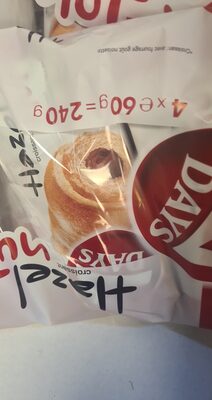
Barcode: 7622201389826
Croissant 7 Days
HARAM
📝 Reason: The identified Haram substances in this product originate from impermissible sources that violate established Islamic dietary regulations and ethical standards.
🏷️ Category: N, /, A
📄 Certificates: Made In The Eu
Ingredients:
Details
Understanding the Halal Status of Croissant 7 Days
Croissant 7 Days is a popular snack that many enjoy, but for those following Halal dietary guidelines, it’s crucial to know its Halal status. Unfortunately, this product is classified as HARAM due to several ingredients that violate Islamic dietary laws. Let’s dive into what makes this croissant unsuitable for Halal diets.
Ingredients Breakdown
The ingredients listed for Croissant 7 Days include:
- Wheat flour
- Palm oil
- Sugar
- Wheat gluten
- Glucose-fructose syrup
- Skimmed milk powder
- Sunflower oil
- Yeast
- Stabilizer (cellulose gum)
- Fat-reduced cocoa powder (0.5%)
- Dextrose
- Iodized salt
- Ethyl alcohol
- Flavoring
- Emulsifiers (mono- and diglycerides of fatty acids, polyglycerol esters of fatty acids)
- Preservatives (calcium propionate, potassium sorbate)
- Egg yolk powder
- Acidity regulators (phosphoric acid, diphosphates)
- Lactose (from milk)
- Gelling agent (sodium alginate)
- Flour treatment agents (ascorbic acid, L-cysteine)
The ingredient that raises the most concern for Halal consumers is ethyl alcohol, which is derived from fermentation. Alcohol consumption is strictly forbidden in Islam, making this croissant unsuitable for Halal diets.
Detailed Review of E-Numbers and Ingredients
Now let’s look closely at the ingredients, particularly the E-numbers, to understand their Halal compliance:
- Wheat flour – Permissible in Islam. A staple ingredient with no Haram components.
- Palm oil – Also permissible. Considered Halal unless sourced unethically.
- Sugar – Permissible. Typically derived from sugar cane or beet.
- Wheat gluten – Halal. Often used as a protein source.
- Glucose-fructose syrup – Halal. Common sweetener with no Haram concerns.
- Skimmed milk powder – Halal but requires ensuring the milk is sourced from Halal-certified animals.
- Sunflower oil – Halal. Good plant-based oil for cooking.
- Yeast – Halal. A necessary component for fermentation in bakery products.
- Stabilizer (cellulose gum) – Halal. Derived from plant materials.
- Fat-reduced cocoa powder (0.5%) – Generally permissible.
- Dextrose – Halal. A form of sugar typically from corn or wheat.
- Iodized salt – Halal. Essential for flavor without Halal issues.
- Ethyl alcohol – HARAM. Clearly violates the dietary laws.
- Flavoring – Might be Halal depending on the source, but ambiguous labeling raises questions.
- Emulsifiers (mono- and diglycerides of fatty acids, polyglycerol esters of fatty acids) – Some may not be Halal. Analyze sources separately.
- Preservatives (calcium propionate, potassium sorbate) – Permissible. Widely used in food products.
- Egg yolk powder – Halal, but verify if from Halal-certified sources.
- Acidity regulators (phosphoric acid, diphosphates) – Generally Halal.
- Lactose (from milk) – Halal if sourced from Halal animals.
- Gelling agent (sodium alginate) – Halal. Derived from algae.
- Flour treatment agents (ascorbic acid, L-cysteine) – L-cysteine can be a concern as it may come from human hair or feathers, so always check sources.
Final Thoughts on Croissant 7 Days Halal Status
In conclusion, while many of the ingredients in Croissant 7 Days are permissible in a Halal diet, the presence of ethyl alcohol makes it outright HARAM for Muslims. If you seek Halal products, it is advisable to look for snacks that are clearly labeled or certified Halal, ensuring they comply with Islamic dietary laws.
